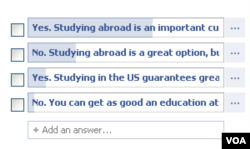“I believe the education system in U.S. ranked the best in the world, and people who have studied in the United States are offered better jobs with better salaries and it’ll be easier for them to find a job,” said Abdullah Habibzai, a civil engineering student at the University of Missouri in an interview for the “Mizzou” international students blog. “That was my ambition since many years ago, to complete my high education in the United States.”
Studying in the U.S. was Abdullah’s ambition, but must it be yours?
In this post, the second in our series looking at the pros and cons of studying in the U.S., we take a more in depth look at some of the factors that may influence your decision.
Some Research
The top three reasons students choose to study overseas are: (1) Higher quality of education; (2) career improvement; (3) the chance to live overseas, according to the British Council’s Student Decision Making Survey. Prospective students hoping to study in the U.S. in particular prioritized improving their job prospects in the survey.
By contrast, prospective UK students cited better education as a motivating factor, and prospective students in Germany low tuition fees.
We all know that, although scholarships and other aid is available, studying in the U.S. is expensive. Those who choose to study here reckon that the benefit is worth the cost. But that calculation depends on what you hope to achieve with an American education.
Is a U.S. Education Always Better?
In our previous post we met Arwa and Amna, two young women who chose to pursue their higher education in Pakistan, and discussed their pros and cons for staying at home or studying abroad. Both say they would have liked to study in the U.S., but they are pursuing their goals in Pakistan and admit that studying abroad may not be the right option for everyone.
In fact, Arwa said, for many Pakistani students, studying in Pakistan is cheaper, easier, and better preparation for their chosen careers.
Sebastian had a similar opinion to Arwa's when comparing education in his home country of Bolivia to that in the U.S. He says there’s a trade-off; a U.S. education exposes you to more subjects and possibilities, but leaves you less prepared for a specific career:
In my country universities don’t offer much out of class college experiences nor have many student involvements groups, they are only teaching institutions. In the other hand, the way academics are presented are totally different. For start, in Bolivia there are no general education requirements so, for example, an economics major like me doesn’t have to take courses like physics or philosophy. That is better in some way because it keeps one focused on the things really important to one’s career only, in the other hand, having “gen ed” helps student open their minds and even gives them the possibility to change their minds before is too late.
Sadia, who is also from Pakistan and currently studying in the U.S., adds that the job market back home is full of highly educated professionals, so an “American degree or verification is not a ticket to get a good job back home …”
Career Relevance
Sadia decided to study in the U.S. because she felt furthered her specific career goals. She is a human resources professional, and wanted to learn more about human resource and project management in a diverse, international workplace.
According to Sadia, a U.S. education may be most appropriate for people wanting to pursue careers that are likely to be highly international. She lists business, consulting, IT and non-profits as some examples.
America was “a good place to study and get the exposure of international community. The biggest advantage is you can get [is to] make a network of people who are all international …”
By contrast, VOA intern Jihye Choi says classmates who studied back home in Korea could have an advantage in building the networks and relationships to help them find a job in Korea after graduation.
Specific Qualifications
There are some careers for which a foreign education is not appropriate at all, particularly those in fields that require specific qualifications. Ryan Pereira from the U.S. India Educational Foundation, which is EducationUSA in India, cautioned students against pursuing a law degree in the U.S. if they plan to practice back home during an an online chat on Rediff.com:
The U.S. first professional degree, the juris doctor (J.D.), provides an education strongly focused on preparation for U.S. practice, with little opportunity for comparative or specialty study. For this reason, and because preparation in U.S. law will not easily transfer toward practice in other countries, the J.D. is usually inappropriate for foreign nationals.
The website myuface.com adds medicine, dentistry and education as careers for which a foreign degree might not qualify you to practice back home.
Perception
In Korea, says Jihye, the name and reputation of your university are important factors in how employers perceive your degree. For Korean students, a well-known university in the U.S. is considered most prestigious, but a name brand university in Korea is given more weight than an unknown university in America.
Jihye provides the following ranking of how universities are viewed in the Korean job market:
Ivy League or other universities that Korean knows really well > Few Korean universities which have good name value > other [foreign] universities (since you can prove that you are fluent in English) > other Korean universities
"This is what Malaysian employers are looking for too," says Shu Wen Teo, a sophomore biology major at Colby-Sawyer, a small liberal arts college in New Hampshire. But she says studying in the U.S. has given her other unique advantages on the job market, which she will use to make up for her school’s lack of name recognition:
If I want to go back to Malaysia and work, yes, I think this will be a disadvantage. That’s why I have to be involved in college activities, and I think I’ll have to use my attitude and my behavior to convince them I’m really ideal for that job if I’m applying for a particular job.
Because now I’ve become more and more not passive – more active – which is not so common among Malaysians unless you study abroad and interact with people from different countries. It will open up your mind – you’re more able to accept other culture differences. I think this is one of the advantages that a lot of local Malaysians don’t have.
And exposure to cultural differences may be one of the biggest arguments for studying in the U.S. (or anywhere overseas).
In an informal poll on our Facebook page, 61% of you felt that studying abroad is a vital cultural experience - a much greater number than those who thought studying abroad would guarantee success in life, or who thought studying abroad is not necessary at all.
Check out Part 3 of this series, where we discuss the pros and cons that come along with the cultural side of studying in the U.S.
Do you agree with the pros and cons listed here? What would you add to this list? Let us know in the comments!








